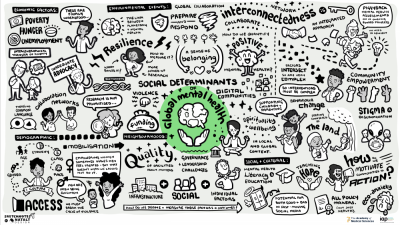


Many social determinants have a significant impact upon mental health. Identifying these determinants and how they intersect is key to developing effective interventions. This issues are analysed in “Addressing the social determinants of global mental health in the Sustainable Development Goals era", a workshop report the InterAcademy Partnership (IAP) and the UK Academy of Medical Sciences just launched. This workshop held in 2019 aimed to provide an overview of our current understanding of social determinants of mental health in low- and middle-income countries (LMICs), and identify barriers and opportunities for tackling mental health problems.
"The COVID-19 pandemic has the potential to exacerbate the impact of the social determinants of mental health,” noted Professor Volker ter Meulen, IAP President.
“Hence researchers, policy makers, research funders, and civil society organisations will have to ensure they consider not only the death toll and economic burden of the novel coronavirus, but also how it will affect the design of specific mental health interventions as we move forward," he added.
The UK Academy of Medical Sciences highlighted seven key issues tackled by the report:
1. Research in LMICs on the five socioenvironmental domains are in their infancy.
Research seeking to understand the social determinants of mental health including the economic, demographic, neighbourhood, environmental, and social and cultural has only just begun. This means that, in LMICs, there are many opportunities to intervene and address them.
2. Interventions can be effective without focusing solely on mental ill health
Effective interventions include wider social aspects and do not focus entirely on mental illness. These lead to positive impacts on a population's mental health more generally. Embedding mental health in other policies and research, for example by including mental health questions in national surveys, will improve data with little expense.
3. Mental health needs to be a criteria for evaluating economic policies
Social protection systems in LMICs are expanding. Yet, evaluation of these programmes omits the effects on mental health. Including mental health as an outcome of economic policies and interventions is vital.
4. We should focus on mental health resilience and preparedness for environmental events
Environmental events, such as armed conflict, climate change and natural disasters impact mental health. Resilience and preparedness should be a key focus for research and resulting interventions.
5. Many themes cut across the five socioenvironmental domains
Addressing these themes will require collaboration with a wider range of academic disciplines and has the potential to improve data collection, community engagement and our wider understanding of what determines whether an individual or community is resilient or susceptible to mental ill health.
6. Research on men’s mental health is still lacking
The gap in current research on the causes of mental ill health among men needs addressing. Cross cultural research will help us understand how gender norms link to suicide incidence, violence and post-traumatic stress disorder among men.
7. Addressing mental health is everyone’s responsibility
Researchers, funders, policy makers and civil society organisations all have a role to play. Researchers should focus on the current research gaps. Funders should consider increased research funding to support diverse studies on social determinants of mental health. Policy makers should ensure all policies consider and positively impact mental health. Success depends on increased collaboration between research disciplines and policy sectors.